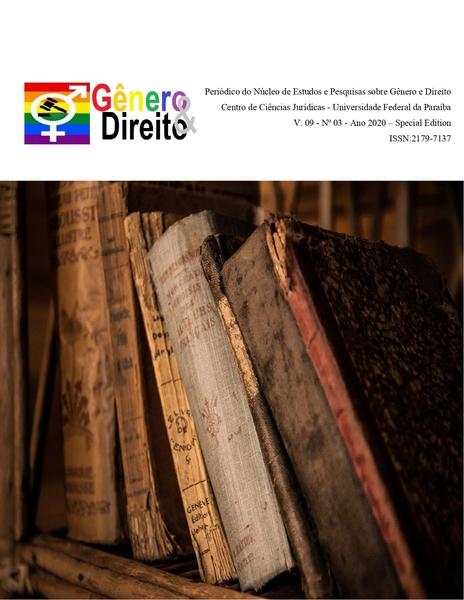ON FORMING THE PROFESSIONS SPECIFICATIONS UNDER THE DEVELOPMENT OF A NEW QUALIFICATIONS SYSTEM
DOI:
https://doi.org/10.22478/ufpb.2179-7137.2020v9n03.52328Palavras-chave:
qualification, national qualifications framework, profession, vocational standard, secondary vocational education.Resumo
Introduction. The article reveals the features of description of secondary vocational education (SVE) graduates’ qualifications. New approaches are proposed for describing the SVE graduates’ qualifications, which take into account the existing traditions and the new aspects related to the changes in the normative regulation of labor market. Objective. To develop the methodology of updating the specifications of manual workers’ occupations and majors of SVE, taking into account the existence of constantly filled up registers of vocational standards and qualifications. Research methodology and methods. Analysis of the retrospective transformations of “qualification” definitions, compared to modern conceptions of this term.
Results. Recommendations are offered, which refer to the description of qualifications when forming the updated professions classification in SVE sphere. The recommendations take into account that, for several years to come, the normative documents and all-Russian classifiers will act, which regulate the existing qualifications system. At the same time, the new, currently forming, qualifications system cannot be ignored. In the article, three alternative approaches to the description for SVE graduates’ qualifications are offered for this difficult situation. To make the final decision, the results of this work are supposed to be discussed with representatives of educational community (educational and methodological associations of SVE) and employers (represented by Councils for professional qualifications). Scientific novelty. The proposed recommendations take into account the increasing influence of the new, currently forming Russian system of qualifications on the labor market. Practical significance. The proposed approaches will promote establishment of compliance between the qualification within the educational system and the qualification apparent for the labor market.
Downloads
Referências
Blinov, V.I., Batrova, O.F., Esenina, E.Yu., Faktorovich, A.A. (2014). Metodicheskiye rekomendatsii po razrabotke professionalnykh obrazovatelnykh programm s uchetom trebovaniy professionalnykh standartov [Methodological recommendations for the development of vocational education programs taking into account the requirements of professional standards]. Moscow: Pero Publishers.
Pilipenko, S.A., Zhidkov, A.A., Karavaeva, E.V., Serova, A.A. (2016). Sopryazheniye FGOS i professionalnykh standartov: byyavklenniye problemy, vozmozhniye podkhody, rekomendatsii po aktualizatsii [Conjugation of Federal state educational standards and professional standards: revealed problems, possible approaches, recommendation on actualization]. Vyssheye obrazovaniye v Rossii [Higher Education in Russia], No. 6(202), pp. 5-15.
Grebnev, L.S. (2006). Akademicheskaya i professionalnaya kvalifikatsii (Bolonskiy protsess i rosssiyskoye zakonodatelstvo) [Academic and professional qualifications (Bologna Process and Russian legislation)]. Vyssheye obrazovaniye v Rossii [Higher Education in Russia], No. 6, pp. 6-15.
Sjur Bergan (2012). Qualifications – comprehension of idea. Moscow: АVANGLION-PRINT.
International Standard Classification of Education 2013. UNESCO, Institute for Statistic, 2014.
Sjur Bergan (2007). Qualifications – Introduction to a concept. Strasbourg: Council of Europe Publishing.
Maguire, Bryan (2010). Issues arising from qualifications frameworks in Europe. Irish Bologna Expert Conference “National Qualifications Frameworks and the European Overarching Frameworks: Supporting Lifelong Learning in European Education and Training”. 15 April, Dublin Castle, Ireland.
The dynamics of qualifications: defining and renewing occupational and educational standards. Cedefop panorama series. Luxembourg: Office for Official Publications of the European Communities, 2009. URL: http://www.cedefop.europa.eu /EN/Files/5195_en.pdf (accessed 12 May 2012).
The shift to learning outcomes. Policies and practices in Europe. Cedefop Reference series; 72. Luxembourg: Office for Official Publications of the European Communities, 2009.
Using learning outcomes – discussion note. Prepared by GHK Consulting as part of the Framework Contract DG EAC 19/06. Main author: Mike Coles; Contributors: Tine Andersen, Karin Luomi-Messerer, Daniela Ulicna. August, 2010.
Bologna process and EQF implementation. Development of qualifications Frameworks. Joint meeting of national correspondents (QF-EHEA) and national coordination points (EQF). Strasbourg, 26 October 2010.
Improvement of Qualifications: on the Way to Systematization: ETF, Qualifications_Publication_Refresh_2017_with_forms_RU.indd 140.
Blinov, V.I., Batrova, O.F., Esenina, E.Yu., Faktorovich, A.A. (2013) Sovremenniye podkhody k otsenivaniyu kvalifikatsiy [Modern approaches to the assessment of qualifications]. Vysshee obrazovanie v Rossii [Higher Education in Russia], No. 5, pp. 100-106.
Blinov, V.I. (2011). Instrumenty modernizatsii possiyskoy natsionalnoy sistemy kvalifikatsiy [Instruments of modernizing the Russian national system of qualifications]. Obrazovatelnaya politika [Educational policy], No. 3 (53), pp. 79-82.
Formirovaniye Natsionalnoy sistemy kvalifikatsii: sbornik normativnykh dokumentov [Formation of the National system of qualifications: collection of normative documents]. Moscow: Pero Publishers.
Blinov, V.I. (2008). Natsionalnaya ramka kvalifikatsiy v Rossiyskoy Federatsii [National Qualifications Framework in the Russian Federation]. Vysshee obrazovanie v Rossii [Higher Education in Russia], No. 1, pp. 44-51.
Blinov, V.I. (2015). Professionaliye standarty – ot razrabotki k primeeniyu [Professional standards – from elaboration to implementation]. Vysshee obrazovanie v Rossii [Higher Education in Russia. No. 4, pp. 5-14.
Blinov, V.I., Esenina, E.Yu., Klink, O.F., Kurteeva, L.N., Satdykov, A.I., Faktorovich, A.A. (2017). Professionalniye standarty: ot idey k praktike. [Professional standards: from ideas to practice]. LAP LAMBERT Academic Publishing RU.
Sazonov, B.A., Yatsenko, V.E., Girinovich, Yu.V. (2006). Obshcherossiyskiye klassifikatory v sfere obrazovaniya: formirovaniye, vedeniye, razvitiye [All-Russia classifications in education: formation, maintaining, development]. Moscow: FIRO.
Sazonov, B.A. (2014). O proyekte novogo obshcherossiyskogo klassifikatora spetsialnostey po obrazovaniyu [On the project of a new All-Russia classification of jobs according to education]. Inzhenernaya pedagogika: Sbornik nauchnykh trudov v 3 t. [Engineering pedagogy: Collection of scientific works in 3 volumes]. Moscow: Center for Engineering Pedagogy of Moscow Administration Traffic Inspectorate, 2014. Issue 16. Vol. 1, pp. 194-198.

